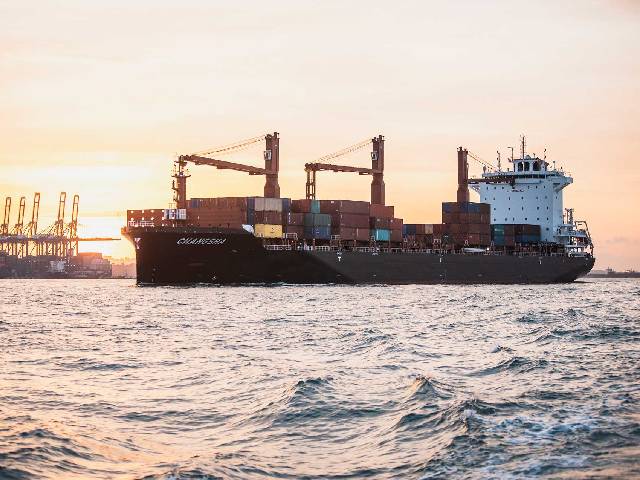The China Navigation Company (CNCo) and Dualog expands it co-operation with the roll-out of a new data exchange solution across its fleet. As they investigated the options, more uses became apparent.
The China Navigation Company (CNCo), headquartered in Singapore, is one of the oldest shipping companies in the world. Its parent company’s history dates back to 1872. As the shipping arm and oldest operating entity of the Swire group, CNCo has grown in tandem with the global economy. It owns and manages a sizeable deep-sea fleet of multi-purpose, container and bulk vessels and has an extensive network of liner, bulk, logistics and shipping agency businesses globally. Today, the company is firmly rooted in the 21st century with a modern fleet and a digital strategy set for the future.

Expanding co-operation
The co-operation with Dualog started in 2011 with the roll-out of Dualog’s class-leading email solution across the entire fleet. As digital operations have expanded, the range of Dualog services has grown as well. The latest joint effort sees the implementation of Dualog® Drive, a maritime-optimised file and folder replication service, designed to streamline the collection and distribution of large data volumes between ship and shore.
Bringing the fleet closer
A core challenge of modern shipping companies going digital is to integrate ships with the rest of the organisation. Every business is an information business; a sentiment very much true for the shipping company of today. This means that all business processes and important events are registered and, eventually, stored in some form of enterprise information system’s database. Consequently, if it is not registered, it has not happened. Sales data is collected in your accounting system; procurements are managed in your procurement system; accidents and incidents are registered in your risk management systems; safety documentation is distributed as digital documents, and the list could go on. Ultimately, everything that is important in an enterprise becomes recorded in digital form in various databases and file-sharing applications.
“The growth of cloud solutions for file sharing and enterprise data management certainly pertains to this business problem. Today’s CIO/CISO or IT Manager must, therefore, have in place solutions that enable secure company-wide data collection and distribution,” explains Gerry Bonner, General Manager Fleet Services, of CNCo.

Overcoming challenges
The caveat? What if your “offices” are away at sea, connected not by superfast, always-on fiberoptic cables but costly satellites with limits to their bandwidth. And what if these “offices” are in fact vessels with a mix of systems, IoT devices and users that must be able to access or share data with the head office regularly?
Andrea Giglietti, Customer Service Manager working from Dualog’s Singapore office, explains the challenges: “The problem is that most shipping companies currently use email-based systems for data and file sharing. Data packets are compiled into smaller, email-sized pieces, sent via a standard email to your ship where it is saved, unpacked and assembled manually. The process is work-intensive, prone to errors, has file size limits, and poses a significant challenge when distributing files across a larger fleet or group of vessels.”

“The problem is that most shipping companies currently use email-based systems for data and file sharing. Data packets are compiled into smaller, email-sized pieces, sent via a standard email to your ship where it is saved, unpacked and assembled manually. The process is work-intensive, prone to errors, has file size limits, and poses a significant challenge when distributing files across a larger fleet or group of vessels.”
Often, he explains, shore personnel have to retrieve critical files and, due to the big size, they need to wait for the ship to be in port and have an agent get the files on a USB stick and transfer to the office. This process is time-consuming and costly.
Moreover, expensive and unreliable satellite connections require you to manage data transfer volume to synchronise with other business communications needs. Having large data transfers halt or stop due to unstable or even faulty connections is not a viable option.
A growing number of use cases
After testing and implementing Dualog® Drive across parts of their fleet, the usefulness of having a reliable file replication solution has become apparent. Gerry Bonner, General Manager Fleet Services, of CNCo explains:
“Safety documentation was our starting point, and we now use Dualog® Drive to distribute and maintain a repository of SMS documents pertaining to all ships in our fleet. As we investigated the options, other potential uses became apparent. We have used the system for IT software distribution, collection of Voyage Data Recorder (VDR) data for urgent investigations, and to share updates of vessel drawings after revisions. We also want to use Drive to ensure that major Equipment Safety Updates and Technical Circulars, as well as Certificates, are updated across our fleet accordingly. We have also used the system to distribute company circulars and safety notices, and we are considering several other situations where we can provide additional benefit to our Ships Staff by using the Dualog Drive application.”
“Safety documentation was our starting point, and we now use Dualog® Drive to distribute and maintain a repository of SMS documents pertaining to all ships in our fleet. As we investigated the options, other potential uses became apparent.”
A game-changer
More and more shipping companies realise that ship connectivity can be leveraged for improved business and vessel performance. For the China Navigation Company, the benefits of going digital are all about maintaining their competitive edge. “When it comes to driving the digital transformation, this solution provides a means by which secure transfer of controlled data between shore to ship for either an individual vessel or as a fleet distribution can be tailored by the user”, explains Gerry Bonner. CNCo plans to have Dualog® Drive fully operational across its 50+ fleet before the summer.






































